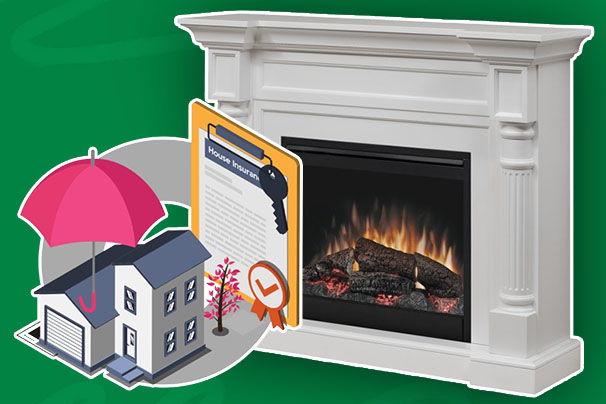Does a Fireplace Increase Home Insurance – A standard homeowners insurance covers damages made due to a fire or smoke. This coverage includes accidental fires due to fireplaces and chimney fires. Having wood-burning fireplaces and stoves can increase your home insurance. This is because your home becomes a high risk to insurers.

In cases where your home is considered a high risk, you will be required to pay more for insurance rates and quotes making it quite difficult to get insurance coverage. The amount of surcharge you may get depends on what type and the quality of your home’s fireplace. Fireplace affects your home insurance because your insurance rates and quotes are determined through the consideration of high-risk possessions in your home.
Most home insurance companies consider a fireplace a high risk because it may lead to unexpected fire and smoke damage. Everything you need to know about how your home insurance is increased by a fireplace is stated as you read through.
Does Having a Fireplace Increase Home Insurance?
Homeowners who have an in-built fireplace may get higher home insurance premiums. This is because it affects your home insurance premiums, causing them to rise.
Whether you will get higher rates depends on the type of fireplace you own and your insurer. Homeowners who have wood-burning fireplaces may get higher home insurance rates. This is because fireplaces like this are more likely to cause a fire than electric or gas-burning fireplaces.
How Does a Fireplace Increase Home Insurance?
Generally, anything that heats your home increases the costs of your home insurance coverage. irrespective of whether it’s a fireplace or what type of fireplace it is, it adds a slight risk to your insurance. Depending on the below factors, a fireplace can add different levels of risk that increase your home insurance.
- Fire: A wood-burning type of fireplace increases the risk of fire in your home. Gas and electric fireplaces can also lead to fire, but they only add risks of an electrical fire.
- Smoke: Fireplaces can create smoke damage, especially when they are not properly maintained.
- Carbon Monoxide: Fireplaces can create carbon monoxide, which can cause serious health issues.
- Heat: The more heat produced from a fireplace, the more risk involved.
Gas and electric fireplaces are less likely to increase your home insurance very much like wood-burning fireplaces would. They tend to carry more risks and increase home insurance costs more.
How Much Does it Cost?
Home insurance companies consider how much risk you are of filing a claim when evaluating home insurance rates. This is because some fireplaces are likely to start a fire. For this reason, they charge more on rates to cover the risks found.
However, you can work towards reducing your home’s risks of fire due to the fireplace and get discounts too. Your home insurer may offer discounts if you safety-proof your home using sprinklers, fire alarms, and smart home detection devices.
Does Home Insurance Cover Damages to a Fireplace?
If your fireplace gets damaged and it is covered by a peril, your home insurance policy may cover damages made. But if your fireplace gets damaged due to wear and tear, negligence, or maintenance issues, your home insurance will not cover damages. This means that if your fireplace gets damaged because it is in a poor state, your home insurance will not cover the damages.
How Much Does a Fireplace Increase Home Insurance?
Your yearly insurance cost may increase by 10% or more each year due to the high risk of a fireplace. You can lessen the cost by paying more deductibles and making sure you do not pay for coverage you do not need.
Does Having a Gas Fireplace Increase Home Insurance?
Gas fireplaces are less risky than wood-burning fireplaces, but they can still increase your insurance coverage costs by 10% annually. However, this modern fireplace can reduce your monthly heating bills by up to 20% or 40%. Home insurance companies may request proof when they offer coverage for gas fireplaces, always use the manufacturer’s manual and suggested guidelines.
What Happens if You Do Not Disclose Your Fireplace to Your Home Insurer?
You may think not telling your home insurance company about your home’s fireplace can help you save up, but it doesn’t work that way. Not informing your home insurer about your home’s fireplace can put you and your loved ones at risk.
If ever you suffer a loss related to your home’s fireplace, your home insurance company may decide not to reimburse your claim and terminate your insurance policy.



